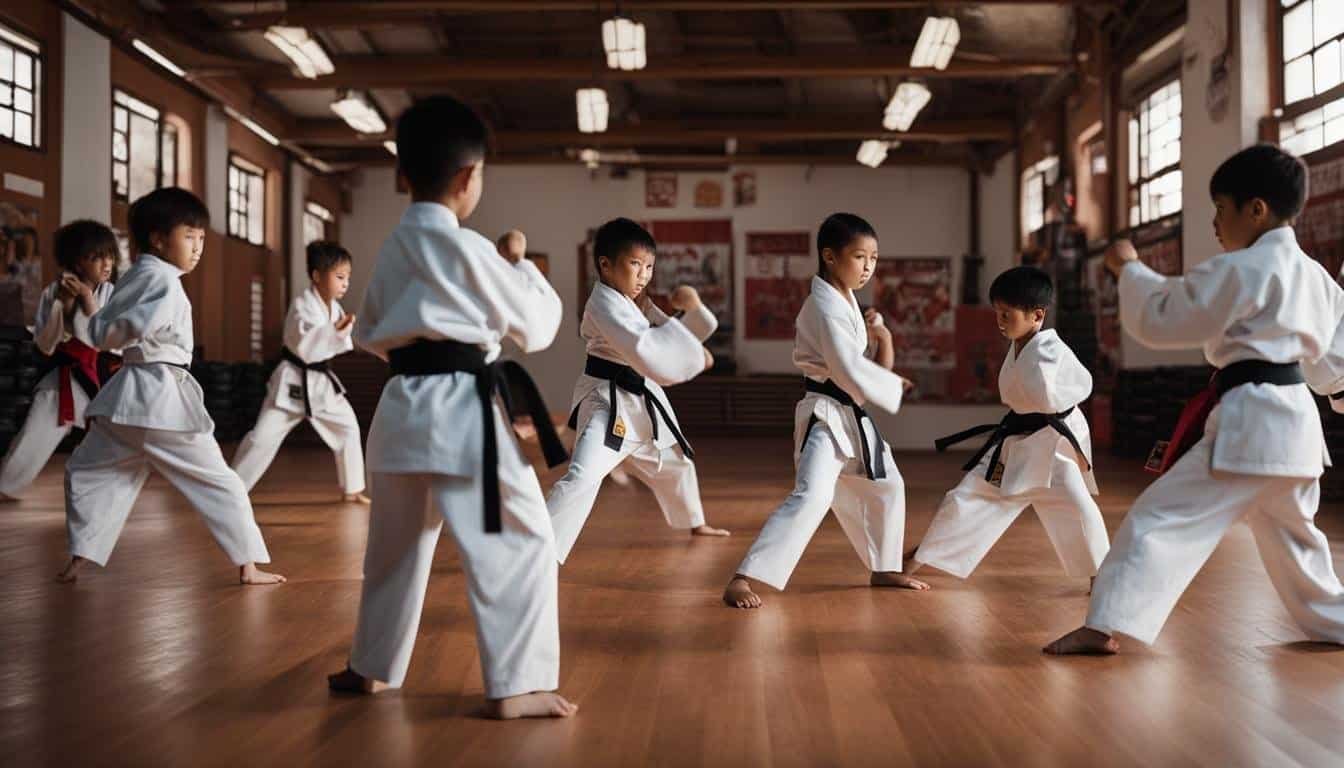Martial Arts for Children: Benefits & Programs
Are you looking for an engaging and exciting physical activity for your child? Look no further than martial arts for children! Martial arts programs provide numerous benefits for kids, including improved physical fitness, enhanced mental health, and the development of essential social skills.
Kids martial arts classes offer a child-friendly environment where boys and girls can learn and grow together. Whether it’s karate, judo, taekwondo, or aikido, there are various martial arts programs specially designed for children.
These programs not only focus on physical fitness but also promote self-discipline, focus, and respect. In a martial arts school for kids, youths can explore the world of martial arts, learning valuable skills that will benefit them both on and off the mat.
Through martial arts training for kids, children can improve their coordination, flexibility, strength, speed, and balance. They will also develop crucial life skills, such as self-confidence, discipline, and reduced aggression.
In this article, we will explore the importance of physical fitness for children, the impact of martial arts on mental health, and the positive effects of martial arts in combating physical inactivity. We will also discuss the cognitive and social benefits of martial arts, as well as how it can boost confidence and self-esteem in children.
Key Takeaways:
- Martial arts for children offer numerous benefits for both physical and mental well-being.
- Kids martial arts classes provide a child-friendly environment for boys and girls to learn and grow together.
- Martial arts training improves physical fitness as well as important life skills such as self-confidence and discipline.
- The impact of martial arts extends beyond physical fitness, benefiting mental health and social skills development.
- Choosing the right martial arts class for your child is essential to ensure a supportive and respectful learning environment.
The Importance of Physical Fitness for Children
Physical fitness plays a crucial role in the proper development and overall well-being of children. However, in today’s modern sedentary lifestyle, physical activity levels among children have significantly decreased, negatively impacting their physical development. It is essential to address this issue and encourage children to engage in activities that promote physical fitness, such as martial arts programs.
Martial arts programs offer a holistic approach to physical fitness, focusing on various aspects of development, including motor skills and cardiorespiratory fitness. Through regular training, children can improve their motor skills, which are essential for daily activities and sports. Martial arts involve techniques that require coordination, balance, and precision, helping children refine their motor skills and enhance their overall physical abilities.
Additionally, martial arts training is an excellent way to improve cardiorespiratory fitness in children. Participating in martial arts classes involves aerobic exercises that elevate heart rate and increase stamina. The repetitive movements and intense bursts of activity during training sessions help strengthen the cardiovascular system and improve endurance.
Benefits of Martial Arts for Physical Fitness
- Enhancement of motor skills
- Improvement in coordination and balance
- Development of cardiovascular endurance
- Increased flexibility and strength
Inspiring children to engage in physical activities that promote physical fitness is vital for their overall health and well-being. Martial arts programs offer an excellent platform for children to develop their motor skills, enhance their cardiorespiratory fitness, and improve various aspects of physical fitness.
By participating in martial arts programs, children can combat the effects of a sedentary lifestyle and promote a healthier lifestyle. Through martial arts training, they not only improve their physical fitness but also develop discipline, self-confidence, and focus. Martial arts provide children with an enjoyable and engaging way to stay active, discover their strengths, and build a foundation for a lifetime of physical well-being.
The Power of Physical Fitness
Physical fitness is more than just a measure of physical abilities. It is a key aspect of overall health and well-being, impacting every aspect of a child’s life. By promoting physical fitness through activities like martial arts, we can equip children with the tools they need to lead active, healthy lives and set them on a path towards lifelong wellness.
The Impact of Martial Arts on Mental Health
In addition to improving physical fitness, martial arts training also provides significant benefits for mental health and personal character development in children. The practice of martial arts can help children cultivate qualities such as determination, consistency, and motivation, contributing to their overall well-being.
The emphasis on self-defense skills in martial arts can enhance a child’s confidence and sense of personal security. By learning techniques to protect themselves physically, children gain a greater sense of empowerment and self-assurance, which can positively impact their mental health and self-esteem.
Regular participation in martial arts training also fosters discipline and focus, as students must learn and memorize various techniques and movements. This discipline translates to other areas of their lives, such as academics and personal responsibilities, promoting better concentration and a strong work ethic.
Martial arts classes often provide a supportive and encouraging environment, fostering positive relationships and social interactions. Instructors and peers promote respect and teamwork, creating a sense of belonging and camaraderie. These social connections can contribute to improved mental well-being, reducing feelings of isolation and enhancing social skills.
“Martial arts training has the potential to significantly improve mental health by fostering qualities such as discipline, focus, and confidence, while also providing a supportive social environment for children to thrive.” – Dr. Jessica Anderson, Child Psychologist
Table: Mental Health Benefits of Martial Arts Training
| Benefit | Description |
|---|---|
| Increased Self-Confidence | Martial arts training helps children develop a strong sense of self and confidence in their abilities. |
| Reduced Aggressiveness | Through discipline and self-control, martial arts can help children manage and channel their aggression in healthier ways. |
| Improved Discipline | The structured nature of martial arts teaches children the importance of discipline and following instructions. |
| Enhanced Focus and Concentration | Martial arts training requires mental focus, helping children improve their attention span and concentration skills. |
By addressing both physical fitness and mental well-being, martial arts training offers a holistic approach to supporting children’s overall development and personal growth.
The Challenge of Physical Inactivity in Children
The progress of technology has resulted in a decrease in physical activity among children, leading to a sedentary lifestyle. This physical inactivity has adverse effects on children’s physical development. Studies have shown that the percentage of children who meet the recommended level of physical activity is alarmingly low.
Martial arts programs provide an opportunity for children to engage in physical activity and combat the negative effects of a sedentary lifestyle. By participating in martial arts classes, children can break free from the confines of screens and technology, and instead focus on movement and physical fitness. Through various martial arts techniques and exercises, children can improve their cardiovascular health, muscle strength, coordination, and flexibility.
“Physical activity not only helps children develop strong bodies, but also builds healthy habits that can last a lifetime.”
Studies have shown that children who lead an active lifestyle are more likely to maintain their physical fitness into adulthood. By participating in martial arts, children not only learn self-defense skills, but also develop a mindset that includes regular physical exercise as a part of their daily routine.
Martial arts training offers a unique and engaging way for children to stay active and combat the negative effects of a sedentary lifestyle. The structured classes, supportive instructors, and fun-filled activities make it easier for children to stay motivated and committed to physical fitness.
Incorporating martial arts into a child’s routine can help break the cycle of physical inactivity and improve their overall health and well-being. It not only provides a platform for physical activity, but also offers numerous benefits for mental health, social skills, and self-confidence. By choosing martial arts as an extracurricular activity for children, parents can play an active role in promoting a healthy and active lifestyle.
The Positive Impact of Martial Arts on Physical Fitness
Martial arts training offers a multitude of benefits when it comes to improving children’s physical fitness. Through a variety of dynamic movements such as punching, kicking, and jumping, children not only develop essential coordination, flexibility, strength, speed, and balance, but also engage their entire body in an enjoyable and challenging way.
Regular practice of martial arts techniques helps children enhance their coordination by synchronizing their movements with precision and fluidity. This improved coordination can have a positive impact on various physical activities, sports, and everyday tasks.
Martial arts training also plays a significant role in developing flexibility. The diverse range of techniques and stretches involved in martial arts practice promote increased muscle elasticity and joint mobility, leading to enhanced overall flexibility. Flexibility is crucial for injury prevention, optimal movement, and overall physical well-being.
Furthermore, martial arts training focuses on building strength, both physically and mentally. The movements and exercises involved in martial arts facilitate muscle development, particularly in the core, legs, and upper body. This increased strength not only benefits performance in martial arts techniques but also promotes better overall physical capabilities.
Another key aspect of martial arts training is speed development. Martial artists are constantly encouraged to move quickly and efficiently, honing their reflexes and reaction times. Regular practice allows children to enhance their speed, whether in executing techniques or reacting to opponents’ movements.
Balance is an integral part of martial arts training as well. Techniques such as kicks and strikes require proper balance and body control. Over time, children develop better balance through martial arts practice, which can translate into improved stability and coordination in various physical activities and sports.
Teamwork and Physical Fitness
Martial arts programs often incorporate exercises and activities that promote teamwork. These team-based initiatives not only foster a sense of camaraderie but also provide additional opportunities for physical fitness and skills development. By working collaboratively with their peers, children can further refine their coordination, flexibility, strength, speed, and balance in a supportive and engaging environment.
| Benefits of Martial Arts Training on Physical Fitness |
|---|
| Improved coordination |
| Increased flexibility |
| Enhanced strength |
| Heightened speed |
| Refined balance |
The Role of Martial Arts in Improving ADHD Symptoms
Martial arts training has shown promise in reducing ADHD symptoms in children. Children with ADHD often struggle with focus and attention, making it challenging for them to concentrate on tasks and stay engaged. However, the structured environment and specific targets in martial arts classes can help children with ADHD improve their ability to pay attention and stay focused.
The practice of martial arts requires students to focus their technique on specific movements and targets. This level of concentration can help sharpen the skills that are often difficult for children with ADHD. By consistently practicing and refining their techniques, children with ADHD can develop enhanced focus and attention spans.
Furthermore, martial arts training incorporates discipline and routine, fostering better self-control and self-regulation. These skills are crucial for managing ADHD symptoms and improving overall attention and behavior. Through the guidance of experienced instructors, children can learn techniques to calm their minds and improve their ability to concentrate.
Studies have shown that martial arts can have positive effects on ADHD symptoms, including improved impulse control, reduced distractibility, and increased self-confidence. The combination of physical activity, mental focus, and self-discipline in martial arts provides a holistic approach to addressing ADHD symptoms.
Incorporating martial arts into the lives of children with ADHD can provide them with a structured outlet for physical activity while simultaneously addressing their unique needs. The discipline and focus required in martial arts can positively impact their ability to concentrate, leading to improved academic performance and overall well-being.
The Health Benefits of Martial Arts for Children
Martial arts provide an effective way for children to improve their physical fitness and engage in regular exercise. In addition to burning calories, martial arts training can improve cardiovascular health, muscle strength, and coordination. By participating in martial arts, children can develop healthy living skills and learn the importance of being physically active.
Martial arts training involves various movements and techniques that target different muscle groups and enhance overall fitness. Whether it’s through practicing kicks, punches, or forms, children actively engage their bodies and work towards improving their physical capabilities.
“Martial arts training is a holistic approach to physical fitness. It challenges the body and helps children develop strength, flexibility, endurance, and balance, all of which contribute to their overall health and well-being.” – Sensei Miyamoto
Beyond the physical aspects, martial arts can have a positive impact on children’s mental and emotional well-being. By setting goals, overcoming challenges, and working towards achieving mastery, children develop a sense of accomplishment and build confidence in their abilities.
Through consistent training and practice, martial arts instill discipline, focus, and perseverance. In a martial arts class, children learn to follow instructions, pay attention, and concentrate on the task at hand. These mental skills are essential for academic success and personal growth.
Moreover, martial arts training often emphasizes values such as respect, integrity, and self-control. In a supportive and structured environment, children learn to interact with their peers, build teamwork skills, and treat others with respect and kindness.
Table: Comparison of Martial Arts and Traditional Forms of Exercise
| Martial Arts | Traditional Exercise |
|---|---|
| Promotes overall fitness through dynamic movements and techniques | Focuses primarily on cardiovascular exercise or strength training |
| Develops self-defense skills | No practical self-defense application |
| Emphasizes discipline, focus, and respect | Focuses solely on physical fitness |
| Provides a structured environment with experienced instructors | May require self-motivation and adherence to a workout routine |
| Promotes personal growth and character development | Primarily focused on physical goals and accomplishments |
Expert Insight: The Role of Martial Arts in Healthy Living
“Martial arts have a profound impact on children’s physical fitness and overall health. It provides a balanced workout that targets various fitness components, including strength, flexibility, endurance, and coordination. By instilling discipline, focus, and respect, martial arts training promotes healthy living habits that extend beyond the dojo. It empowers children to prioritize their well-being and become physically active individuals.” – Dr. Li Wei, Sports Science Researcher
By participating in martial arts, children not only gain physical strength but also develop a mindset that promotes healthy living. They learn to embrace challenges, set goals, and take responsibility for their well-being. Martial arts training becomes more than just exercise; it becomes a lifestyle that supports physical, mental, and emotional health.
The Cognitive Benefits of Martial Arts for Children
Martial arts training offers more than just physical fitness benefits for children. It can also have a positive impact on their cognitive development, enhancing skills such as memorization, concentration, and overall cognitive ability.
Through the practice of martial arts techniques, children are required to memorize a variety of movements, sequences, and forms. This constant repetition helps to improve their memorization skills, as they learn to recall and execute techniques with precision. The ability to memorize movements and techniques is not only useful in martial arts but can also translate to other areas of life, such as academic learning.
Concentration is another cognitive skill that is greatly improved through martial arts training. During classes or practice sessions, children must stay focused and concentrate on executing techniques correctly. This constant focus enhances their ability to concentrate and stay present, which can be beneficial in academic settings, where sustained attention is crucial for learning and retaining information.
To further develop cognitive skills, martial arts training often involves activities that challenge children to think quickly and make decisions in a fast-paced environment. Whether it’s reacting to an opponent’s movements or adapting to different sparring scenarios, children learn to think on their feet and make split-second decisions. This type of cognitive processing strengthens their ability to think critically and make informed choices.
The cognitive benefits of martial arts training can have a positive impact on children’s overall development. By improving their memorization, concentration, and cognitive skills, martial arts can help children become more focused, disciplined, and mentally agile individuals.
Benefits of Martial Arts Training on Children’s Cognitive Skills:
| Cognitive Skills | Description |
|---|---|
| Memorization | Improves memory and recall abilities through the repetition of techniques and movements. |
| Concentration | Enhances focus and attention span, improving children’s ability to concentrate on tasks. |
| Critical Thinking | Develops the ability to think quickly and make informed decisions in fast-paced situations. |
| Problem-Solving | Encourages children to find creative solutions and adapt to different sparring scenarios. |
By engaging in martial arts training, children not only improve their physical fitness but also sharpen their cognitive skills, setting a solid foundation for their future success.
The Social Benefits of Martial Arts for Children
Martial arts programs provide valuable opportunities for children to develop crucial social skills that transcend the boundaries of the training mat. While martial arts training primarily focuses on individual growth and improvement, it also incorporates exercises and activities that foster teamwork, respect, and social interaction.
Through collaborative exercises, children learn the importance of working together towards a common goal. These activities not only promote physical fitness and skill development but also cultivate a sense of camaraderie and teamwork among participants. Children engage in partner drills, group demonstrations, and cooperative exercises that require effective communication and cooperation.
Benefits of Teamwork:
- Enhances communication and problem-solving skills
- Promotes cooperation and collaboration
- Fosters a sense of belonging and unity
- Develops leadership qualities
In addition to teamwork, martial arts programs emphasize the core value of respect. Children are encouraged to respect their instructors, classmates, and themselves. This fosters an environment of mutual respect and helps children build meaningful relationships based on trust and understanding.
“Respect for self and others is a fundamental principle that underlies the practice of martial arts. By instilling this value in children, they learn to appreciate the diverse perspectives and abilities of their peers, promoting a positive and supportive environment.”
Martial arts also provide an ideal setting for social interaction. Children have the opportunity to meet and train with peers who share their passion for martial arts. This shared interest creates a strong sense of community and can lead to lasting friendships both inside and outside the training facility. Social interaction in martial arts enables children to develop communication skills, empathy, and the ability to relate to others effectively.
Benefits of Social Interaction:
- Enhances social skills and emotional intelligence
- Promotes empathy and understanding of others
- Provides a supportive network and sense of belonging
- Encourages lifelong friendships
The combination of teamwork, respect, and social interaction in martial arts programs not only enhances physical fitness and self-defense skills but also nurtures well-rounded individuals who are confident, respectful, and capable of thriving in diverse social settings.
| Key Social Benefits of Martial Arts for Children | Explanation |
|---|---|
| Improved teamwork skills | Martial arts training involves collaborative exercises that teach children the value of teamwork and cooperation. |
| Promotion of respect | Children are encouraged to respect their instructors, peers, and themselves, fostering a culture of respect within the martial arts community. |
| Enhanced social interaction | Martial arts provide an environment for children to interact with peers who share their interests, leading to the development of strong friendships and improved social skills. |
Boosting Confidence and Self-Esteem through Martial Arts
Martial arts training offers a unique opportunity for children to enhance their self-improvement, individual growth, confidence, and self-esteem. Unlike team sports that focus on competition with others, martial arts allows children to concentrate on their own progress and personal achievements.
As children progress through different levels and earn colored belts, they experience a sense of accomplishment. Each milestone reached represents their hard work and dedication, boosting their confidence and self-esteem. This journey of self-improvement fosters a positive mindset and encourages children to believe in their abilities.
Furthermore, martial arts training emphasizes personal growth and development. Through regular practice and discipline, children learn to set goals, overcome challenges, and push their limits. This process not only builds physical strength but also instills mental resilience, cultivating a resilient mindset that can be applied to various aspects of life.
The supportive environment in martial arts classes is conducive to building confidence and self-esteem. Instructors provide guidance and encouragement, creating a safe space for children to explore and express themselves. Additionally, the camaraderie among peers fosters positive social interactions, reinforcing a sense of belonging.
By participating in martial arts, children develop a strong sense of self-worth, enhancing their overall confidence and self-esteem. These qualities are invaluable and contribute to their personal growth and success in all areas of life.
Choosing the Right Martial Arts Class for Your Child
When it comes to enrolling your child in a martial arts class, it’s essential to consider several factors to ensure the best experience and development for your child. The teaching approach and the supportiveness of the instructors play a crucial role in shaping your child’s martial arts journey.
Traditional Approach
A traditional approach to martial arts emphasizes more than just physical techniques. It focuses on character development, instilling discipline, respect, and values that extend beyond the training mat. Look for a class that honors the roots and traditions of martial arts while incorporating modern teaching methods.
Supportiveness
Supportive instructors are essential for a positive and fulfilling martial arts experience for your child. Find a class where the instructors are patient, encouraging, and genuinely interested in helping every student thrive. A supportive environment fosters a sense of belonging and motivates your child to reach their full potential.
Additionally, consider the student-to-teacher ratio in the class. A lower ratio ensures that your child receives individual attention and guidance, enabling them to progress at their own pace and address their specific needs.
| Factors to Consider | Benefits |
|---|---|
| Teaching Approach | A traditional approach focuses on character development. |
| Supportiveness of Instructors | Encouraging instructors create a positive learning environment. |
| Student-to-Teacher Ratio | Individual attention for personalized learning. |
By carefully considering these factors, you can choose a martial arts class that aligns with your values and provides the best learning experience for your child. Remember, finding the right martial arts class can set the foundation for a lifelong passion and a journey of personal growth.
Conclusion
Martial arts programs offer a wide range of benefits for children, promoting their physical fitness, mental health, and social skills. Through martial arts training, children can develop improved coordination, flexibility, strength, speed, and balance, leading to overall physical fitness and wellness. Furthermore, martial arts contribute to enhanced mental well-being, increased self-confidence, and positive social interaction.
Choosing the right martial arts class for your child is crucial. Look for a program that aligns with your child’s needs and values, promoting a supportive and respectful learning environment. By enrolling your child in a reputable martial arts school, you can ensure they receive expert guidance and instruction that fosters their development in a safe and structured setting.
Martial arts for children is not just about physical activity; it is a holistic approach to personal growth. By engaging in martial arts, children can learn valuable life skills, such as discipline, perseverance, respect, and self-improvement. These skills extend beyond the training mat and can positively impact various aspects of a child’s life, nurturing their overall character and well-being.
Whether your child is looking to improve their physical fitness, boost their confidence, or develop social skills, martial arts is an excellent avenue for their growth. Leveraging the physical, mental, and social benefits of martial arts, your child can thrive both inside and outside the training space, setting them up for a healthy and successful future.






